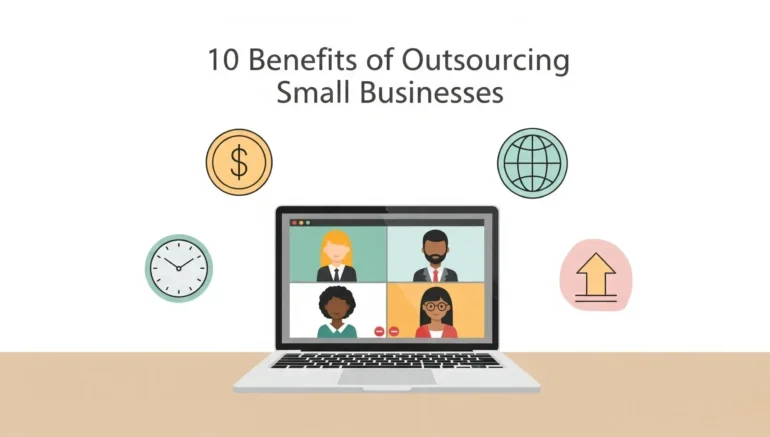
10 Benefits of Outsourcing Small Businesses
Running a small business comes with a lot of challenges. From managing daily operations to handling customer needs, it can quickly become overwhelming. Many small business owners find themselves wearing multiple hats, which can slow growth and reduce efficiency. This is where outsourcing small businesses becomes a smart choice. By hiring external experts or companies to handle certain tasks, business owners can save time, avoid burnout, and improve overall performance.
Outsourcing is not just for large corporations, it can bring major advantages to small businesses too. It helps reduce costs, access specialized skills, and maintain flexibility in operations. For small businesses trying to grow without increasing overhead, outsourcing can be a game changer. In this article, we’ll explore 10 benefits of outsourcing small businesses, showing how it can help you work smarter, reduce stress, and reach your goals faster.
Here are some 10 Benefits of Outsourcing Small Businesses
Outsourcing Small Businesses Saves Time
Time is one of the most valuable resources for any business, and small business owners often find themselves running out of it. When small businesses outsource certain tasks, they free up more hours to focus on core activities like marketing, sales, and customer service. For example, outsourcing accounting, payroll, or IT support removes the need to spend long hours on technical work that takes attention away from growth. It also helps employees avoid being stretched too thin, allowing them to concentrate on their strengths. By delegating routine or complex tasks to experts, business owners can reduce stress and improve overall efficiency. This makes outsourcing not just a time saver but also a smart way to build consistency in operations.
 Here are a few practical tips to save time with outsourcing:
Here are a few practical tips to save time with outsourcing:
- Make a list of repetitive tasks that consume too much of your schedule.
- Start outsourcing non core tasks like bookkeeping, admin work, or customer support.
- Use outsourcing for specialized work that requires expert knowledge instead of learning it yourself.
- Track the hours you save and reinvest them into business growth activities.
Outsourcing Small Businesses Reduces Costs
One of the biggest advantages of outsourcing is cost savings, which is very important for small businesses working with limited budgets. Hiring full time employees for every task can be expensive, especially when you add salaries, training, and employee benefits. Outsourcing allows businesses to pay only for the services they need, which means there are no extra costs tied to unused time or unnecessary staff. In addition, outsourcing often eliminates expenses for office space, software, or equipment since the service provider covers those needs. This makes it easier for small businesses to control their budget while still getting quality work done. For tasks that don’t require full time attention, outsourcing is not only more practical but also more cost effective. Over time, these savings can be reinvested into marketing, product improvement, or customer service to help the business grow.
 Here are some practical ways outsourcing reduces costs:
Here are some practical ways outsourcing reduces costs:
- Pay for work only when needed instead of maintaining full time staff.
- Avoid costs related to employee benefits, insurance, and training.
- Cut expenses for office space, utilities, and equipment.
- Reduce mistakes and rework by hiring skilled professionals right away.
- Reinvest saved money into business areas that generate revenue.
Provides Access to Skilled Experts
Not every small business has the resources to hire specialized staff for every task, especially when budgets are tight. Outsourcing gives small businesses the opportunity to work with experts who already have the knowledge, tools, and experience needed in specific fields. This is especially helpful in areas such as website design, SEO, digital marketing, accounting, or IT support. Instead of spending months learning new skills or hiring costly full time specialists, outsourcing provides access to professionals on demand. With the right outsourcing partner, small businesses can compete with larger companies by tapping into the same level of expertise. This opens doors to growth opportunities that might otherwise be out of reach.
 Here are some smart ways to use outsourcing for expert support:
Here are some smart ways to use outsourcing for expert support:
- Hire digital marketing experts to grow online visibility and attract more customers.
- Outsource web design and development instead of hiring an in house IT team.
- Use financial experts for bookkeeping, tax preparation, and payroll.
- Partner with content writers or graphic designers for marketing materials.
- Work with specialized consultants who can guide strategy and planning.
- Tip: Look for outsourcing partners with a proven track record and positive client reviews.
- Tip: Ask for portfolios or examples of previous work before hiring.
Outsourcing Small Businesses Increases Flexibility
Small businesses often deal with changing workloads, and it can be difficult to predict how much staff is needed at different times of the year. Outsourcing gives businesses the flexibility to scale services up or down depending on their current situation. For example, a retail store may need extra customer service support during the holiday season but much less once the peak is over. Instead of hiring permanent staff and paying for unused hours during slow months, outsourcing provides a more practical solution. This approach allows business owners to respond quickly to changes without taking on unnecessary costs. Over time, this adaptability helps businesses remain stable and competitive.
 Here are some flexible ways outsourcing supports small businesses:
Here are some flexible ways outsourcing supports small businesses:
- Add temporary staff during busy seasons without long term commitments.
- Scale back services during slow months to save money.
- Test new projects by outsourcing specialized work before investing heavily.
- Quickly replace tasks that are slowing down operations with outsourced support.
- Adjust the level of service anytime to match customer demand.
Improves Focus on Core Activities
Small business owners often have limited time and resources, which makes it difficult to give enough attention to the areas that truly generate income. By outsourcing routine or specialized tasks, owners can redirect their energy toward activities that directly drive revenue and growth. For instance, instead of spending hours on bookkeeping, administrative work, or IT issues, they can focus on building customer relationships, refining products, and improving services. This shift not only increases productivity but also helps prevent burnout, as the business owner is no longer bogged down with tasks outside their expertise.
 Here are some ways outsourcing improves focus on core activities:
Here are some ways outsourcing improves focus on core activities:
- Identify tasks that do not directly generate income and consider outsourcing them.
- Delegate time consuming administrative work to free up more hours for strategy and growth.
- Use outsourcing for specialized jobs that require expertise outside your main skill set.
- Regularly review outsourced tasks to make sure they continue to support business goals.
- Reinvest saved time into activities that strengthen your brand and customer experience.
Outsourcing Small Businesses Supports Growth
As small businesses expand, the demand for additional support and resources naturally increases. Hiring multiple full time employees too quickly can be risky and expensive, especially if growth slows down later. Outsourcing offers a scalable solution that can grow alongside the business without the financial strain of maintaining a large workforce. Businesses can start small by outsourcing just a few services and then gradually expand the scope as demand rises. This flexibility ensures that resources are used wisely while still meeting customer expectations. Outsourcing also helps businesses handle sudden spikes in workload without the stress of rushed hiring. By scaling steadily through outsourcing, small businesses can grow at a healthy pace and avoid costly mistakes.
 Outsourcing supports business growth:
Outsourcing supports business growth:
- Start with a few key outsourced services and expand as your business grows.
- Use outsourcing to test new markets or projects before hiring more staff.
- Scale up or down quickly without the financial risks of permanent hiring.
- Track performance metrics to measure the impact of outsourcing on growth.
- Reinvest the savings from outsourcing into marketing, technology, or product development.
Provides Innovative Ideas
Working with external experts often introduces new perspectives that small businesses may not have thought of on their own. Outsourcing partners bring experience from working with different clients and industries, which allows them to share strategies and tools that can improve business operations. These fresh insights can spark innovative approaches to marketing, customer service, and product development. For example, an outsourced digital marketing team might recommend new advertising platforms or techniques that deliver better results. By staying open to outside input, small businesses can adapt more easily to changes in the market and stay ahead of competitors.
 Here are some ways outsourcing can inspire innovation:
Here are some ways outsourcing can inspire innovation:
- Ask outsourcing partners to share the latest industry trends and tools.
- Encourage open discussions where new strategies and ideas can be presented.
- Use outsourcing to explore creative approaches without long term commitments.
- Apply new suggestions to improve customer experience and streamline processes.
- Stay flexible and willing to test innovative solutions that may benefit your business.
Helps with Risk Management
Every business, no matter the size, faces risks ranging from financial issues to operational challenges. For small businesses with limited staff and resources, even small mistakes can create big setbacks. Outsourcing certain tasks, such as payroll, accounting, or legal compliance, helps reduce these risks by putting them in the hands of experienced professionals. These experts are trained to handle complex processes accurately and in line with regulations, lowering the chance of costly errors. It also reduces the burden on business owners, who might otherwise struggle to keep up with changing rules and requirements. By outsourcing high risk areas, small businesses gain more stability and confidence in their operations.
 Here are some ways outsourcing helps manage risks:
Here are some ways outsourcing helps manage risks:
- Outsource payroll and tax services to avoid penalties or compliance errors.
- Use IT outsourcing to protect sensitive data and strengthen cybersecurity.
- Hire legal or HR experts to handle contracts and employee management correctly.
- Rely on experienced professionals to reduce the risk of financial mismanagement.
- Establish clear agreements with outsourcing partners to define accountability.
- Tip: Choose outsourcing partners who follow industry regulations and standards.
- Tip: Use contracts that clearly define responsibilities and liabilities.
Allows 24/7 Operations
Some outsourced services can operate around the clock, giving small businesses a way to provide support and service even outside normal working hours. This is especially useful for businesses with global customers in different time zones or those that rely heavily on online operations. For example, outsourcing customer support or IT services ensures that problems are addressed quickly, no matter the time of day. This constant availability improves customer satisfaction and builds trust, since clients know help is always accessible. It also allows small businesses to compete with larger companies that already have 24/7 support.

Outsourcing supports 24/7 operations:
- Outsource customer service to provide round the clock support for clients.
- Use IT support teams that monitor systems day and night to resolve issues quickly.
- Partner with outsourcing providers in different time zones for global coverage.
- Offer after hours assistance without paying overtime to in house employees.
- Improve customer trust and loyalty by ensuring support is always available.
Provides Competitive Advantage
By using outsourcing effectively, small businesses can achieve more with fewer resources. Access to specialized skills, improved efficiency, and reduced costs create a competitive edge. Outsourcing helps small businesses offer better services, faster response times, and higher quality products compared to competitors with limited resources.
 Here are some ways outsourcing creates a competitive advantage:
Here are some ways outsourcing creates a competitive advantage:
- Access professional services that raise the quality of your products and services.
- Deliver faster results by relying on experts who already know the best practices.
- Keep costs low while offering better value to customers.
- Stay flexible and adapt quickly to market changes without delays.
- Compete with larger companies by using outsourced skills and technology.
Conclusion
Outsourcing gives small businesses the chance to grow smarter without carrying heavy costs or added stress. From saving time and reducing expenses to gaining expert support and flexible services, it helps owners focus on what truly drives success. By outsourcing, businesses can adapt to changing needs, reduce risks, and even run operations around the clock without stretching resources too thin. It also brings new ideas and strategies from experienced professionals, helping small businesses stay competitive in a fast moving market. Instead of trying to do everything alone, outsourcing allows owners to concentrate on building strong customer relationships and reaching long term goals. The benefits are clear, but the best results come when you choose the right partners and focus on the areas that matter most.
Read Next: 10 Outsourcing Services Every Startup Should Consider










